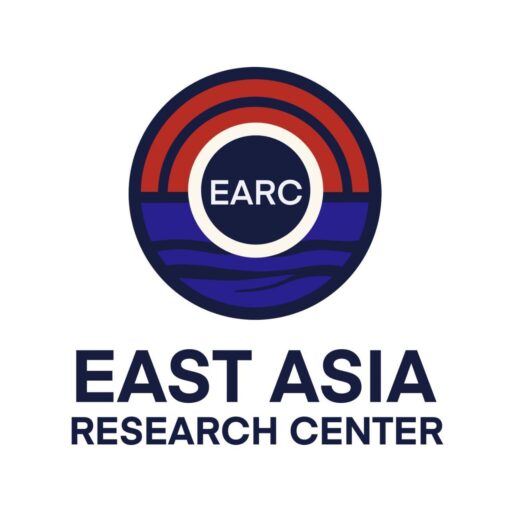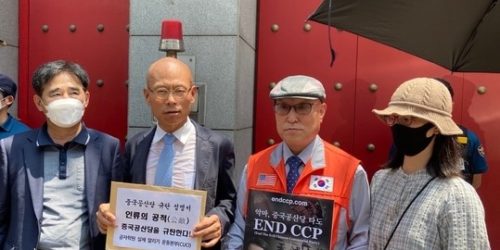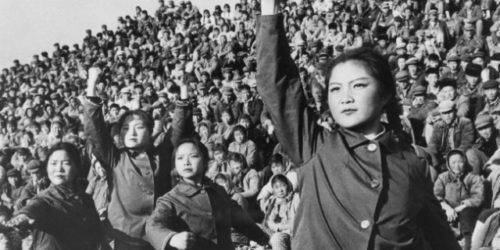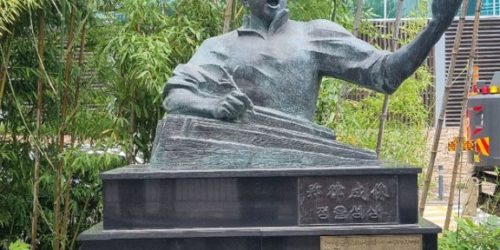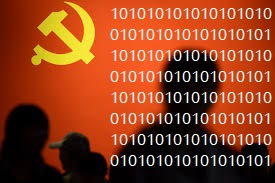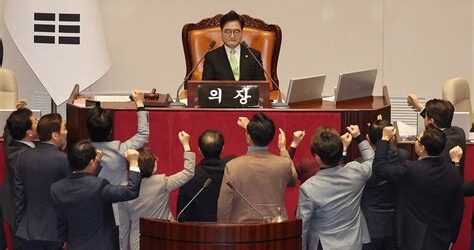Major South Korean Political Parties Signed Agreements with the Chinese Communist Party (CCP)
2023-11-5, Tara O
Two major political parties in South Korea have signed agreements with the Chinese Communist Party (CCP). Furthermore, a large number of lawmakers, 100, signed up to be members of a new organization of lawmakers between China and South Korea, designed to go around restrictions.
It is important to note that in communist party-run countries, the party is above the state, not below. In this instance, the CCP is above the state, while in the Republic of Korea (ROK), the political parties are below the state. Thus, it is more accurate to think of these agreements as the cooperation of South Korean political factions directly with the Chinese Communist government, and all of the resources that the Chinese state can bring to bear, rather than with the resource-constrained and monitored political parties of the western and its value-sharing states working along common political interests.
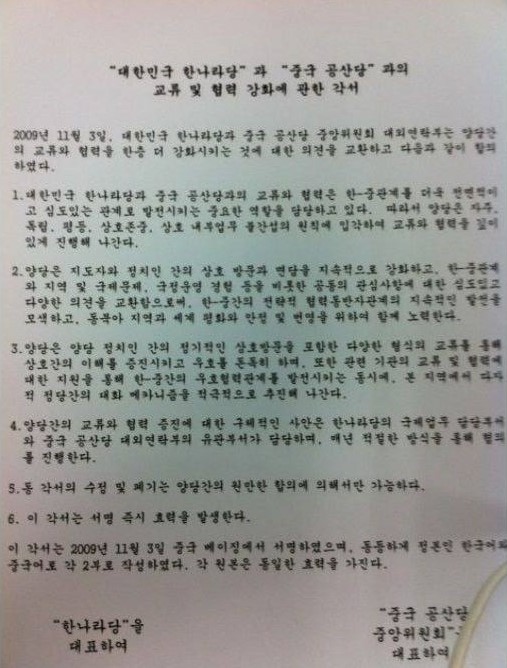
Above: GNP-CCP agreement of 2009-11-3
On November 3, 2009 in Beijing, the Grand National Party (GNP, Hannara Dang), the predecessor to the People Power Party (PPP), signed an agreement with the CCP, specifically with its Central Committee. In the name of strengthening exchanges and cooperation, it seeks visits by politicians and leaders, exchanging views on international issues as well as exchanging views on running the country’s domestic affairs. The latter seem to run counter to China’s insistence that others do not interfere in its domestic affairs, and its claims that it does not interfere in other country’s domestic affairs.
Paragraph 5 states that modifying or terminating the agreement is possible only when both parties—the GNP and CCP—agree amicably. In other words, if the CCP does not want the agreement to end, the agreement cannot end. Surprisingly, the termination clause is much stricter than the Mutual Defense Treaty between the U.S. and the Republic of Korea.
It is unclear whether PPP inherited the agreement from GNP.
DPK-CCP Agreement
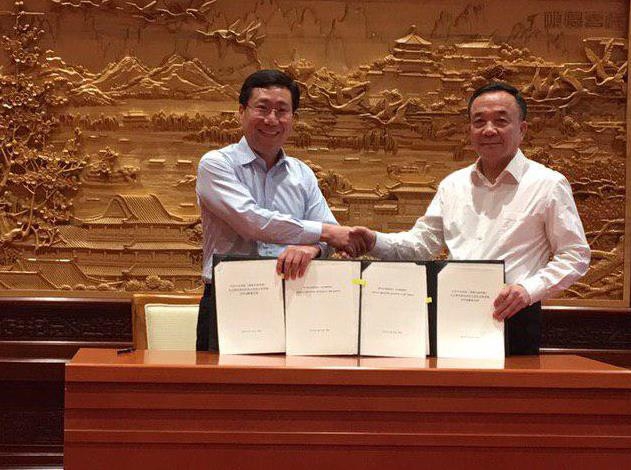
Above: Democratic Party of Korea’s Yang Jung-chul (left) signed an agreement with CCP Central Party School’s Vice President Li Ji on 2019-7-10, source: Yonhap News
Nine months before the April 2020 National Election in Korea, the Democratic Party of Korea (DPK) (or Deobureo Minjoo Dang in Korean, 더불어민주당) also signed an agreement with the CCP on July 10, 2019. Yang Jung-chul (양정철), then-Director of the Institute for Democracy, an arm of the DPK responsible for election strategy, visited Beijing in July 2019 and signed an agreement with the CCP Central Committee’s Party School (Central Party School), which produces the party elites. Initially, it was established as Marx School of Communism under the CCP Central Committee in 1933. The CCP Central Party School superintendents include Xi Jinping, Hu Jintao, and Mao Zedong.
Yang Jung-chul is a close confidant of previous president Moon Jae-in and wielded significant influence behind the Moon administration. In the April 2020 elections, his party, the DPK, won in an unexpected landslide, but instead of rejoicing, he hurriedly resigned and left Korea, stating “I’m terrified and afraid because they made such an enormous outcome (landslide victory for his party).”
Han-Joong Uiwon Yonmang (한중의원연맹, Korea-China Parliamentary Federation)
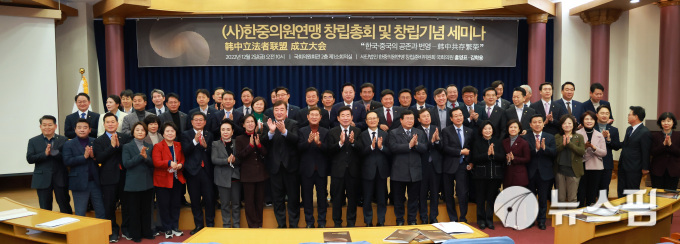
Above: Korea-China Parliamentary Federation founding celebration, 2022-12-2, Source: Newspim
The CCP’s influence over the lawmakers of various South Korean parties is suspected even more with the establishment of the Han-Joong Uiwon Yonmang (한중의원연맹, Korea-China Parliamentary Federation) last year. The below is quoted from “China’s United Front Influence Operation Agencies in Korea Revealed as Search for Chinese Police Stations Continue; Political Ties Discovered” found here.
On December 2, 2022, 100 South Korean lawmakers became founding members of the Han-Joong Uiwon Yonmang (한중의원연맹, Korea-China Parliamentary Federation) at an inauguration ceremony held at the National Assembly in Yoido, Seoul. That is 100 of 300 or 1/3 of the South Korean National Assembly. The slogan on the banner read “Korea-China Co-existence and Prosperity.”
The two lawmakers in the Preparatory Committee for the Founding of the Korea-China Parliamentary Federation were Hong Young-pyo (홍영표), Democratic Party of Korea (DPK, Deobureo Minjoo Party) and Kim Hak-yong (김학용), People Power Party (PPP). Hong Young-pyo became the chairman and Kim Hak-yong became the Senior Vice President of the new corporation. Hong stated, “the Korea-China Parliamentary Federation will be a stepping stone for the two countries to work together with one heart and create a prosperous future.”
Additionally, the Board of Directors elected are as follows: Kang Byung-won (강병원), Kim Sung-won (김성원), Kim Young-bae (김영배), Kim Cheol-min (김철민), Mang Sung-kyu (맹성규), Park Kwang-on (박광온), Park Jeung (박정), Yu Eui-dong (유의동), Youn Kun-young (윤건영), Jeon Bong-min (전봉민), Joo Ho-young (주호영), Jin Sun-mee (진선미), and Hong Kee-won (홍기원).
The two groups –“Korea-China Parliamentary Forum on Foreign Relations” (한중의회외교포럼) and the “Regular Exchange System between the Korea-China Parliaments” (한중의회 간 정기교류체제)—already existed. However, “the limitations of parliamentary diplomacy with China” applies to these existing groups, and they sought to bypass the limitations. The limitations may include the maximum amount of money the lawmakers can receive, as stipulated in the Kim Yong-ran Law.”
Here are the 100 lawmakers who signed up to be the members of the Korea-China Parliamentary Federation:
Democratic Party of Korea (더불어민주당) (59):
▲ Kang Deuk-gu (강득구)
▲ Kang Byung-won (강병원)
▲ Kang Sun-woo (강선우)
▲ Ko Young-in (고영인)
▲ Kwon Chil-seung (권칠승)
▲ Kim Kyung-hyup (김경협)
▲ Kim Nam-kuk (김남국)
▲ Kim Duk-wan (김두관)
▲ Kim Min-ki (김민기)
▲ Kim Byung-wook (김병욱)
▲ Kim Sung-joo (김성주)
▲ Kim Young-bae (김영배)
▲ Kim Eui-kyeom (김의겸)
▲ Kim Ju-young (김주영)
▲ Kim Cheol-min (김철민)
▲ Kim Hang-jung (김한정)
▲ Kim Hoi-jae (김회재)
▲ Do Jong-hwan (도종환)
▲ Mang Sung-kyu (맹성규)
▲ Min Hong-chul (민홍철)
▲ Park Kwang-on (박광온)
▲ Park Yong-jin (박용진)
▲ Park Jeung (박정)
▲ Seo Sam-seok (서삼석)
▲ Sul Hoon (설훈)
▲ So Byung-chul (소병철)
▲ So Byung-hoon (소병훈)
▲ Shin Hyun-young (신현영)
▲ Ahn Gyu-back (안규백)
▲ An Ho-young (안호영)
▲ Yang Kyung-sook (양경숙)
▲ Yang Ki-dae (양기대)
▲ Eoh Kiy-ku (어기구)
▲ Oh Gi-hyoung (오기형)
▲ Wi Seong-gon (위성곤)
▲ Youn Kun-young (윤건영)
▲ Youn Kwan-suk (윤관석)
▲ Yoon Yeong-deok (윤영덕)
▲ Yoon Young-chan (윤영찬)
▲ Yoon Jae-kab (윤재갑)
▲ Yoon Joon-byeong (윤준병)
▲ Lee Kai-ho (이개호)
▲ Lee Byung-hoon (이병훈)
▲ Lee Sang-heon (이상헌)
▲ Lee Yong-sun (이용선)
▲ Lee In-young (이인영)
▲ Lee Jae-jung (이재정)
▲ Lim Jong-seong (임종성)
▲ Jang Chul-min (장철민)
▲ Jeon Hae-cheol (전해철)
▲ Jung Tae-ho (정태호)
▲ Jin Sun-mee (진선미)
▲ Choe Kang-wook (최강욱)
▲ Choi In-ho (최인호)
▲ Han Jeoung-ae (한정애)
▲ Huh Young (허영)
▲ Hong Kee-won (홍기원)
▲ Hong Sung-kook (홍성국)
▲ Hong Young-pyo (홍영표)
People Power Party (국민의힘) (35):
▲ Kang Dae-sik (강대식)
▲ Kang Min-kuk (강민국)
▲ Kwon Myung-ho (권명호)
▲ Kim Sung-won (김성원)
▲ Kim Seung-su (김승수)
▲ Kim Hak-yong (김학용)
▲ Kim Hyung-dong (김형동)
▲ Kim Hee-gon (김희곤)
▲ Rho Yong-ho (노용호)
▲ Park Duk-hyum (박덕흠)
▲ Park Sung-joong (박성중)
▲ Baek Jong-hean (백종헌)
▲ Suh Bum-soo (서범수)
▲ Suh Jung-sook (서정숙)
▲ Yu Eui-dong (유의동)
▲ Yoo Sang-bum (유상범)
▲ Yun Ju-keyng (윤주경)
▲ Lee Dal-gon (이달곤)
▲ Lee Myoung-su (이명수)
▲ Lee Jong-seong (이종성)
▲ Lee Hun-seung (이헌승)
▲ Lim Byung-heon (임병헌)
▲ Jeon Bong-min (전봉민)
▲ Jeong Dong-man (정동만)
▲ Jung Hee-yong (정희용)
▲ Cho Eun-hee (조은희)
▲ Joo Ho-young (주호영)
▲ Choi Seung-jae (최승재)
▲ Choi Youn-suk (최연숙)
▲ Choi Young-hee (최영희)
▲ Choi Chun-sik (최춘식)
▲ Choi Hyung-du (최형두)
▲ Ha Tae-keung (하태경)
▲ Her Eun-a (허은아)
▲ Hwangbo Seung-hee (황보승희)
Justice Party (정의당) (3):
▲Bae Jin-gyo (배진교)
▲Sim Sang-jeung (심상정)
▲Lee Eun-ju (이은주)
Transition Korea Party (시대전환, Shidae Jeonhan-dang) (1):
▲Cho Jung-hun (조정훈)
Non-affiliated (무소속) (2):
▲Kim Hong-gul (김홍걸) (the son of former president Kim Dae-jung)
▲Yang Jung-suk (양정숙)
In September 2022, Li Zhanshu, Chairman of the Standing Committee of China’s National People’s Congress (SCCNPC, 중국 전국인민대표대회) visited the National Assembly, where he met Kim Jin-pyo (김진표), the National Assembly Speaker, and lawmakers in other political parties. After the meetings, the efforts to create the Korea-China Parliamentary Federation suddenly accelerated.
Given the vast resources of the Chinese Communist Party, the large number of South Korean lawmakers from across the political spectrum participating in this Korea-China Parliamentary Federation, and the desire to use a corporate entity to get around existing anti-corruption laws, this development deserves more visibility from NGOs, news organizations, and government watch-dogs. These actions risk South-Korea’s lawmakers becoming proxies of the Chinese Communist Party through influence, graft, and corruption.
Note: The negative view of China begin to rise rapidly in Korea from about 2017. In a 2022 poll, China was the country that South Koreans had the most negative view, at 81%. It appears that there is a major discrepancy between the South Korean citizens and their representatives.
